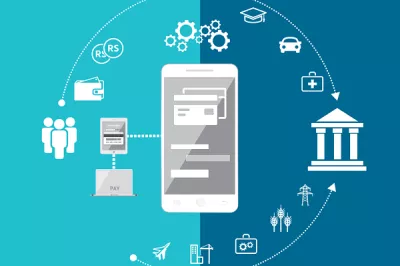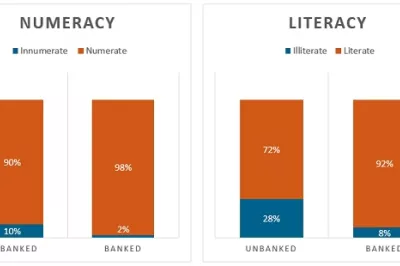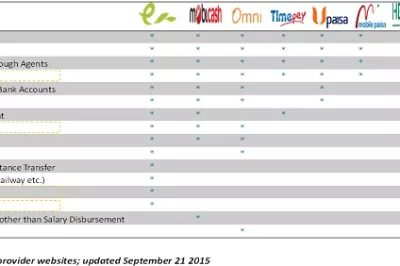Mobile Money in Pakistan: From OTC to Accounts, Part 1
Pakistan is the most competitive mobile money market in the world - eight heavyweight providers representing four different operational models compete for market share. With so much competition, you would expect Pakistan to be a hotbed for mobile money product innovation, with providers vying to separate themselves from the pack. However, the latest data from the Intermedia Financial Inclusion Insights (FII) survey suggests that providers continue to focus on basic over-the-counter (OTC) services. This is alarming. None of Pakistan’s potential for digital financial inclusion will be realized if providers and policymakers don’t ramp-up efforts to migrate OTC customers to mobile accounts.
The FII survey in Pakistan, funded by the Bill & Melinda Gates Foundation, will be repeated annually and has four parts: a nationally representative survey of 6,000 Pakistani adults (15+); focus group discussions with mobile money users and nonusers; qualitative interviews with mobile money agents; and exit interviews with users at those same agents.
So what did we learn from the FII survey?

94% of respondents who use mobile money do not have an account, preferring to conduct transactions through an agent’s account. Only 1% of unregistered mobile money users have even tried to register for an account. At some level, customer preference for OTC reflects a broader preference for cash – 87% of respondents considered cash to be the best option when paying for small transactions, such as purchasing food. Even among banked customers, 79% prefer going to the bank and transacting in person, citing safety as the main reason.
The vast majority of agents don’t even offer accounts. Unsurprisingly, lack of an agent close to where people live was one of the top three reasons for using OTC and not registering. One agent commented: “No, I don’t think any such [registration] process exists,” and another remarked: “What do you mean by registered users?”
40% of respondents didn’t see the need to open a mobile account. Many customers were simply unaware that having a mobile account was even an option, while others did not know what they could do if they got one, especially over and above what transacting via OTC offers. That’s not surprising given that most mobile account services offer little beyond bill payment and money transfer. In focus groups, people commented: “I use agent’s account to send money because I don’t have enough information about other methods of sending money.” One agent commented that “90% of customers do not know that they can open an account and transfer money.”
Customer satisfaction with agents remains high and contributes to OTC use. No respondents reported encountering an agent that did not know how to perform the transaction. Over half the respondents reported using the same agent all or most of the time, citing speed and trust as the reasons for returning to that agent. In fact, 42% of unregistered users cited “satisfaction with using an agent” as the main reason not to register an account.
Men are far more likely than women to use mobile money. 11% of male adults use mobile money versus 3% of women. The gender gap could even grow if mobile money use expands beyond OTC – while 89% of men and 70% of women could access a mobile phone, only 38% of women own their own phone versus 80% of men. Access, of course, is a generous word. One woman explained: “I don’t have a mobile phone and only use my brother’s phone. They put the phone on charging and, if it rings, then we see the name of the person calling and tell my brother. If he allows, then we pick it up; if he doesn’t, then we don’t.”
Mobile phone usage patterns could pose barriers to move past OTC. Only 42% percent of adults use text messaging in addition to making and receiving calls. In focus groups and interviews, Pakistanis report that reading and writing text messages is a challenge. Participants found it difficult to write SMS in Urdu on a QWERTY keyboard. The influx of Chinese phones with Chinese characters has made cell phone use, beyond making and receiving calls, even more difficult. The phones are inexpensive and reach a large number of people, but can be unwieldy if you have to do more than make or receive a call: “…we have this problem that the China [phone] menu [is] almost completely in Chinese…Their games…we don’t understand them. And SMS language setting is another story.”
In short, OTC usage in Pakistan represents a paradox: It is popular and has extended digital payment connectivity to previously unbanked communities. But the success of OTC has also made it more difficult to encourage account adoption: why go through the hassle of learning a new product if I can pay bills and transfer money by simply giving my money to an agent?
Without coordinated policy and regulatory action to streamline account opening processes, combined with serious commercial efforts to create compelling reasons for Pakistanis – both men and women – to use accounts and overcome meaningful barriers to digital finance, the market will struggle to transition beyond OTC.
But it is not all doom and gloom. In the next post, we make note of a flurry of recent policy, regulatory, and commercial developments that just may trigger rapid growth in mobile account usage in 2015.




Comments
The OTC and cash culture will
The OTC and cash culture will continue in the foreseeable future unless a sustained effort is undertaken by all stakeholders to educate the end user of mobile services, so far there appears limited focus on this aspect by the service providers, including Telcos, Microfinance Banks and scheduled commercial banks. Regrettably, even the role of regulators, in this regards remains minimal.
Thanks, Jamal. We often hear
Thanks, Jamal. We often hear that people need to be educated about mobile financial services but if the services are compelling enough, wouldn't people use them? I am not sure a sustained effort to educate end users of mobile services will overcome the disconnect between where services are today and what people need. We need better services but I know that is easier said than done and I know that my colleagues and friends running these services in Pakistan today are keen to find a path to a compelling offering to wean people off cash.
The question is why an agent
The question is why an agent would loose a regular OTC transacting customer by opening an account where he / she can transfer money for free? Major players have to come up with a mechanism to share income with agent who opens that account. (Like telco driven franchise model)
The problem is that everyone is trying to sell wallets to customers instead of agent.
Cash culture is extremely
Cash culture is extremely hard to get rid off, but where FI products have not been able to encourage adoption of wallets, perhaps technology could. And technology can only fly if the agents are on-board as well. So why not employ more user-friendly technology that benefits both the agents and wallet customers? That should entice mobile wallet recruitment.
Add new comment